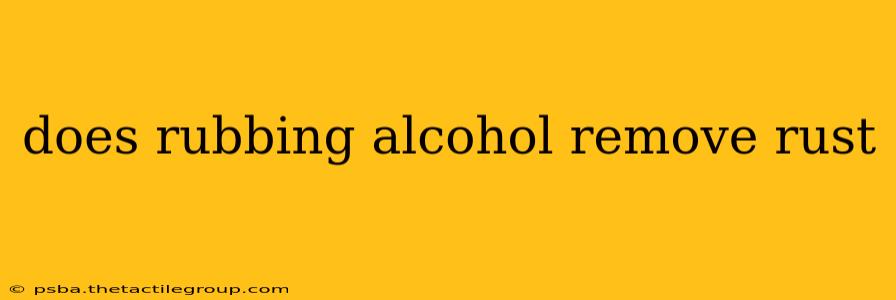Rust. That insidious orange scourge that plagues everything from antique tools to modern machinery. We've all been there, staring at a rusted object, wondering how to restore it to its former glory. And rubbing alcohol – that ubiquitous household staple – often enters the conversation. But does rubbing alcohol actually remove rust? The short answer is: not effectively. While it might offer some minor cleaning action, it's not a reliable or efficient method for significant rust removal.
Understanding Rust and its Removal
Before we delve into the limitations of rubbing alcohol, let's understand what rust is and why it's so difficult to remove. Rust is essentially iron oxide, a chemical compound formed when iron reacts with oxygen in the presence of water or moisture. This reaction creates a layer of oxidation that weakens the underlying metal and compromises its structural integrity. Removing rust often requires breaking down this iron oxide bond.
Why Rubbing Alcohol Falls Short
Rubbing alcohol, or isopropyl alcohol, is a solvent. It dissolves certain substances, but it doesn't possess the chemical properties necessary to effectively break down the strong bonds in iron oxide. While it might slightly clean the surface of a lightly rusted object, removing loose particles of rust and dirt, it won't penetrate and dissolve the rust itself. For significant rust removal, more potent methods are required.
Effective Rust Removal Methods
Several methods prove far more effective than rubbing alcohol for rust removal. The best choice depends on the severity of the rust, the type of metal, and your desired outcome. Here are some popular options:
1. Steel Wool and Degreaser:
For light surface rust, a combination of fine steel wool and a degreasing agent can be surprisingly effective. The steel wool gently abrades the rust, while the degreaser helps lift away any grime and loose particles. Remember to always wear appropriate safety gear, including gloves and eye protection.
2. White Vinegar:
White vinegar is a natural and surprisingly effective rust remover. Its acidity helps to break down the iron oxide over time. Submerging the rusted item in white vinegar for several hours, or even overnight, can yield noticeable results. The longer the soak, the more rust will be removed.
3. Commercial Rust Removers:
The market offers a wide range of commercial rust removers, each with its own formulation and application method. These often contain stronger acids or chemicals that effectively dissolve rust. Always follow the manufacturer's instructions carefully, as these products can be corrosive.
4. Sandblasting or Electrolysis:
For heavily rusted items, more aggressive methods like sandblasting or electrolysis may be necessary. These are more involved processes, often requiring specialized equipment and expertise. Sandblasting uses high-pressure air to remove rust, while electrolysis uses an electrical current to break down the iron oxide.
Conclusion: Rubbing Alcohol's Place in Rust Removal
While rubbing alcohol might have a minor role in cleaning a slightly rusted surface, it's not a viable solution for effective rust removal. Its solvent properties are insufficient to break down the iron oxide bonds. For effective rust removal, consider the more powerful methods outlined above, choosing the most appropriate technique based on the severity of the rust and the type of metal involved. Remember safety precautions when handling rust removers and always choose the method best suited for your specific needs and skill level.

